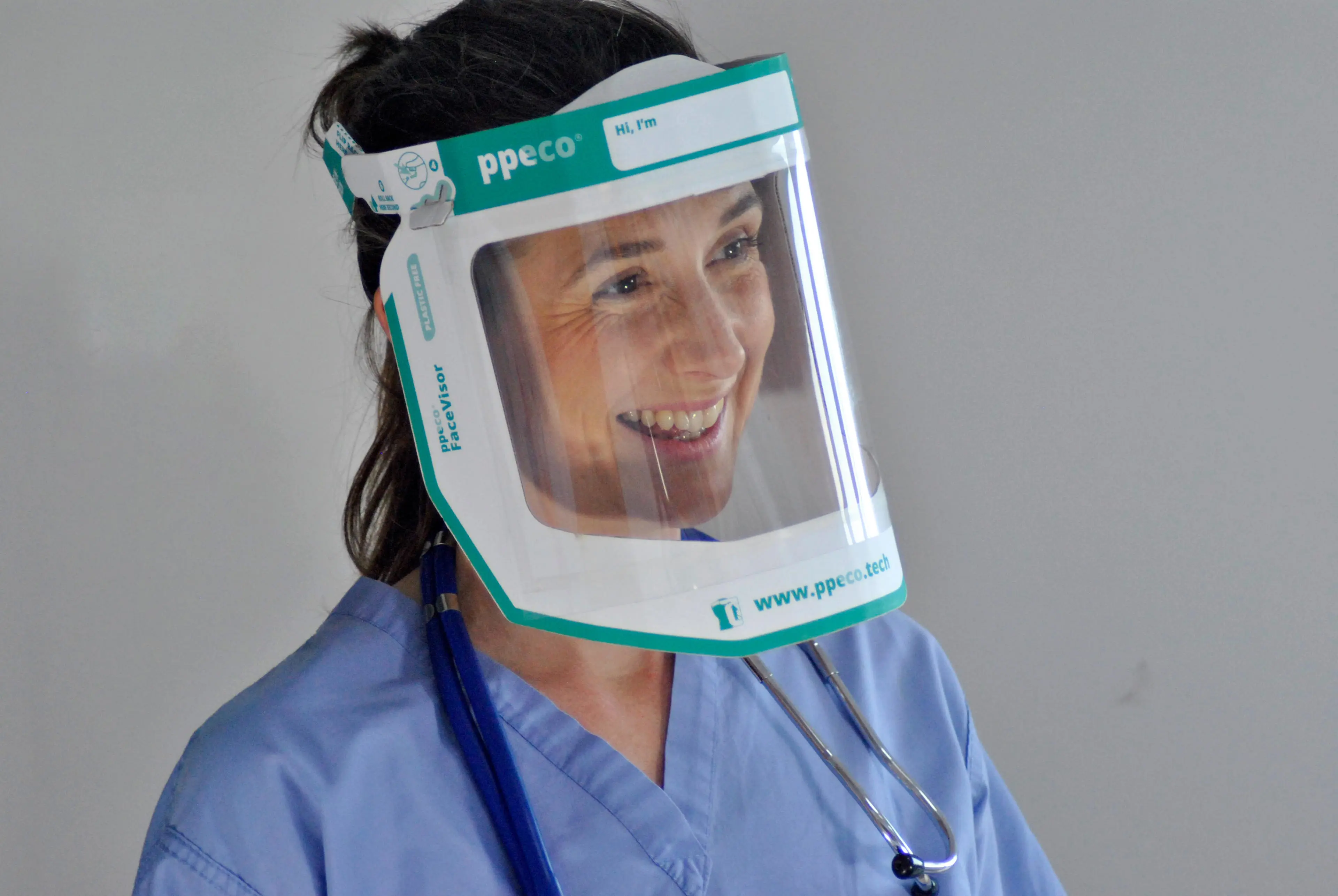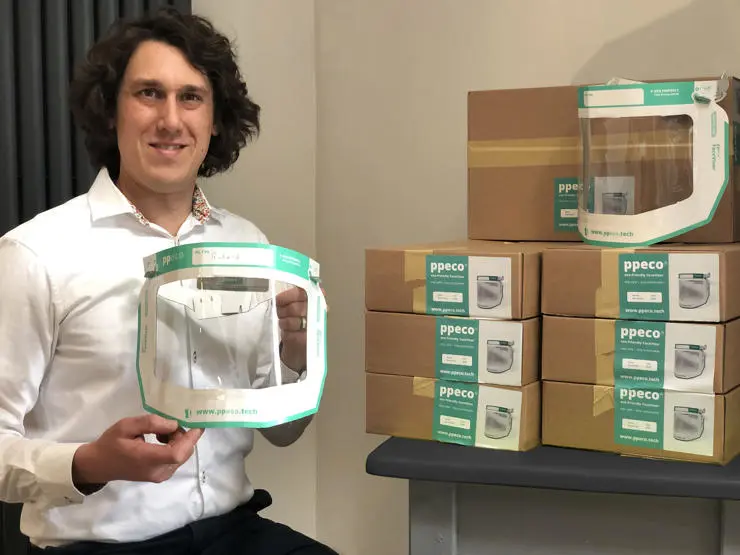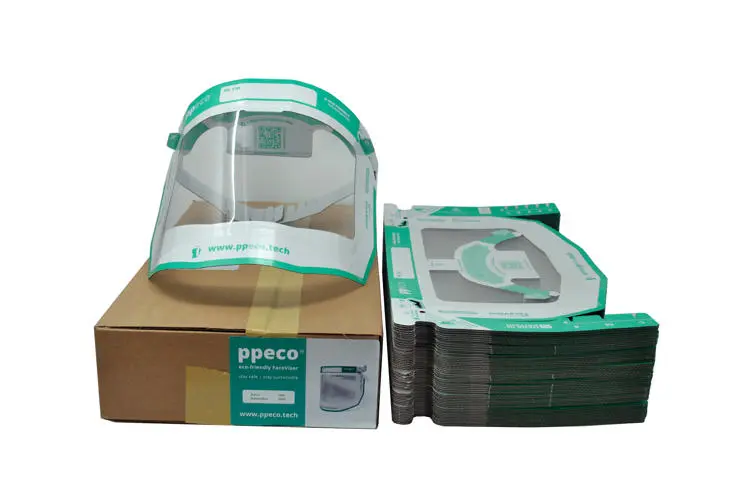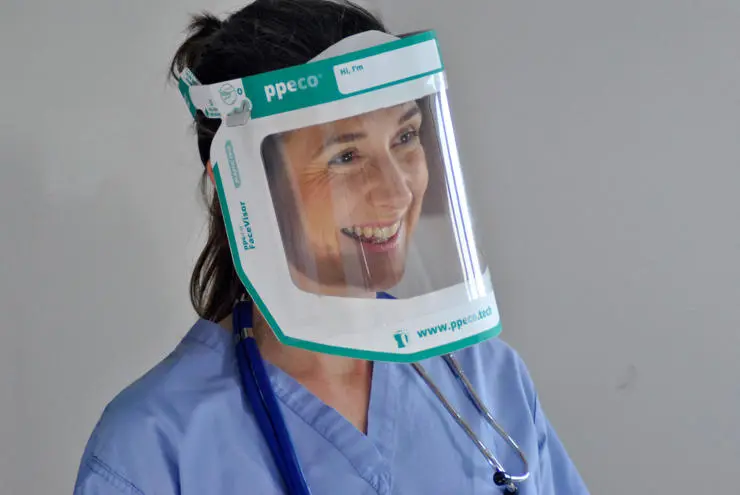PPECO taps into expertise from the Allied Health Research Unit and MedTech Solutions Group
A small independent business has enlisted the help of researchers from the University of Central Lancashire (UCLan) to bring one of the first fully biodegradable PPE face visors to market in less than six months.
PPECO, a micro-business based in Preston and headed up by industrial product designer Richard Taylor, has teamed up with the Allied Health Research Unit, the Innovation Clinic and the MedTech Solutions Group at UCLan to develop an entirely plastic-free, fully recyclable and fully bio-degradable face visor that can be used within the health sector as well as many other settings such as care homes, hospitality and retail.
PPE waste has become a mounting issue that has continued to worsen throughout the pandemic. In England alone 2.3 billion items of single use PPE were distributed to health and social care services between February and July 2020*, the same amount distributed throughout the whole of 2019. If normal patterns of waste disposal continue, it is expected that 75% of PPE waste will end up polluting the oceans or in landfill.**
With rising environmental concerns around single- use, plastic PPE and how it is disposed of, it is crucial that both governments and industry consider plastic-free alternatives, like the PPECO FaceVisor, which is not only fully biodegradable but emits between 70-85% less CO2 in material choice when compared to standard plastic visors.
"Access to the academic expertise at UCLan has helped us in a number of different ways and has made a huge difference, especially as we are a small team trying to complete an ambitious task in a short space of time."
— PPECO CEO and founder Richard Taylor
The visor is designed with a paper-based headband and frame, whilst the optic uses a cellulose acetate which is a wood-pulp based material, making it not only environmentally friendly but also fog resistant. It can also be cleaned with appropriate materials.
Richard came up with the idea for the visor in early lockdown last year after seeing his GP wife struggle to access the correct PPE. After securing an Innovate UK grant in June 2020 to turn his idea into reality, Richard and his team contacted UCLan to help with development.
Led by Professor Jim Richards, the UCLan Allied Health Research Unit has tested and developed the product in a number of different ways including assessing structural integrity, safety, protection and usability, which was supported through UCLan’s European Regional Development Fund (ERDF) funded Innovation Clinic.
PPECO CEO and founder Richard said: “Getting a new product from concept through to market can normally take around 18 to 24 months but the PPECO FaceVisor has achieved this in just six months. Access to the academic expertise at UCLan has helped us in a number of different ways and has made a huge difference, especially as we are a small team trying to complete an ambitious task in a short space of time.”
The UCLan Innovation Clinic has performed a competitor analysis that suggests there is no other product in the UK that has the same eco-credentials as the PPECO FaceVisor yet is extremely robust at the same time.
The Allied Health Research Unit has also been exploring the thoughts and opinions of individuals who need to wear visors daily, including key workers such as nurses and allied health professionals. More than 400 units have been distributed to be tested and the feedback will be used to help guide future product developments.
"The work we’re doing will inform several research projects in the future and we are already planning further work with the University’s MedTech Solutions Group to map out particle movements around the visor to fully explore its effectiveness and inform future design iterations."
— Professor of Biomechanics and research lead for the Allied Health Research Unit Jim Richards
Professor of Biomechanics and research lead for the Allied Health Research Unit Jim Richards commented: “We’re delighted to work with PPECO on a product that is very much needed by a multitude of industries. The work we’re doing will inform several research projects in the future and we are already planning further work with the University’s MedTech Solutions Group to map out particle movements around the visor to fully explore its effectiveness and inform future design iterations.”
“Our visor is the only one made of corrugated cardboard and this 3D design makes it very robust, which is needed by front-line healthcare workers” said Richard.
“We’re operating in a rapidly-changing marketplace so it’s important we can show that we have conducted independent feedback regarding the efficacy of the product from the University and key-workers.”
The product has received its CE certification, meaning it conforms with all the required health, safety, and environmental protection standards to be sold within the European Economic Area.
"Another feature that makes this product special is its low carbon footprint of supply. The visors come flat-packed and 50 visors can fit into a small box, which is not only important to keep transport costs down but also means reduced storage space both in warehouses and in user premises."
— Dr David Taylor, Supply Chain Director from PPECO
The PPECO FaceVisor has already been used within several NHS Trusts, as well as other industries such as manufacturing, education and retail. Another key focus is on humanitarian aid and health care industries in developing countries.
Dr David Taylor, Supply Chain Director from PPECO, added: “Another feature that makes this product special is its low carbon footprint of supply. The visors come flat-packed and 50 visors can fit into a small box, which is not only important to keep transport costs down but also means reduced storage space both in warehouses and in user premises.
“The FaceVisors are currently being produced in the UK by a major manufacturer capable of producing 100,000 units a day. What’s more, the manufacturing process can be easily replicated in other countries and in due course, we will be exploring international markets. It also means developing countries can produce this element of PPE on home soil without the need for imports.”



